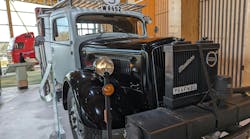For all practical purposes, the State of Illinois is the trucking capital of the world. On any given day, more trucks roll down Illinois roads than almost anywhere else on earth.
Or so it seems if you're driving along I-88, I-80 or I-55, day or night. Approximately 800,000 truck movements take place daily on Illinois roads in a state that has 11.7-billion miles of truck traffic per year — the highest in the nation.
Since the 1960s, federal and state tax dollars have rewarded Illinois with an incredible 2,164 miles of interstate highways-more than any other jurisdiction. This amounts to a road builder's heaven-on-earth, generating more “political pork” than the real stuff produced by Illinois farmers.
Commercial trucks operating within the state help make Illinois the economic equivalent of the 11th largest country on earth. With trucking such an enormous component of Illinois' economic vitality, one wonders why its General Assembly and Governor are in the process of de-feathering this golden goose with needlessly burdensome taxation.
This past summer, for example, they created a tax spike in trucking that will make Illinois the second-highest truck registration taxing authority in the country, only slightly behind Arizona. Combined with the state's diesel tax (fifth-highest in the nation), the new tax now makes Illinois the number-three truck-taxing jurisdiction in the U.S.
Desperate for fresh revenue in the waning days of the legislative session, the new tax was slipped in under cover of political darkness and signed into law by the newly-elected Governor before friends of trucking could rally opposition. Illinois didn't even have the sense to study the potential economic impact of the new taxes on trucking businesses.
According to Don Schaefer, chief executive of the Mid-West Truckers Assn., “The new taxes will have an adverse impact on trucking and other businesses in local communities. Registration fees rose from $2,790 to $3,794 per truck, or 36%. Its really unconscionable for government to make that big a grab on an industry already overburdened with taxes. We'll see a truck flight from the state; that's almost certain.”
The new law will also make it far more difficult to qualify for the rolling stock sales tax exemption for interstate carriers. Strictly in-state operations do not qualify at all. The new government scheme will cost the Illinois trucking industry $80 to $92 million more per year, or about $80 more per day, per truck.
The long-term effects of this tax increase will be significant. Henderson Trucking Co., located downstate in the small town of Salem, plans to relocate its operation to Missouri. With 200 employees on payroll, this move would be crippling for the town and Marion County, which has already lost 4,000 jobs in the last year.
Other fleets have already moved their headquarters to Indiana, where the base registration per truck is $1,350-about 65% less than Illinois. In the past two years, thousands of truck registrations have migrated out of Illinois into Indiana. This trend will no doubt rise dramatically in the next year and beyond. While Illinois registrations have dropped, neighboring Indiana's registration has increased by 30,000.
Instead of gaining new tax revenue, the state will most likely lose ground across the economy as many of trucking's golden geese fly off to more favorable climes.
Gary Petty is President and CEO of NPTC. His column appears monthly in FLEET OWNER.


